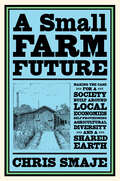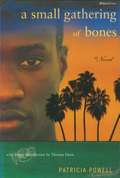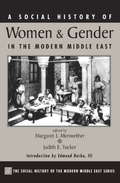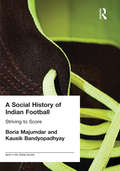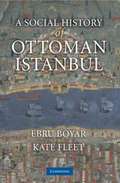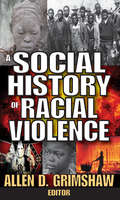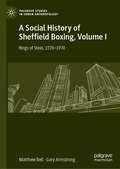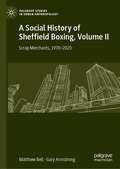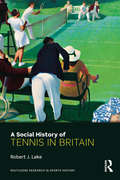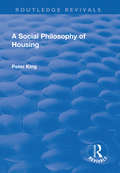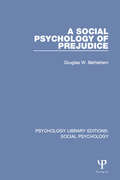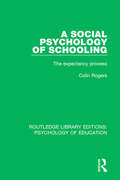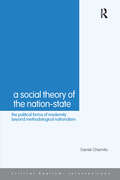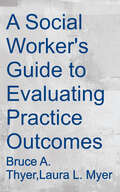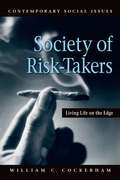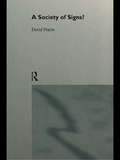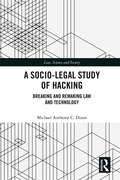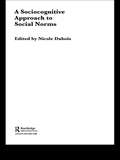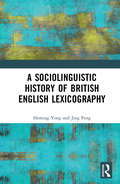- Table View
- List View
A Small Farm Future: Making the Case for a Society Built Around Local Economies, Self-Provisioning, Agricultural Diversity and a Shared Earth
by Chris SmajeIn a time of looming uncertainties, what would a truly resilient society look like? In a groundbreaking debut, farmer and social scientist Chris Smaje argues that organising society around small-scale farming offers the soundest, sanest and most reasonable response to climate change and other crises of civilisation—and will yield humanity’s best chance at survival. Drawing on a vast range of sources from across a multitude of disciplines, A Small Farm Future analyses the complex forces that make societal change inevitable; explains how low-carbon, locally self-reliant agrarian communities can empower us to successfully confront these changes head on; and explores the pathways for delivering this vision politically. Challenging both conventional wisdom and utopian blueprints, A Small Farm Future offers rigorous original analysis of wicked problems and hidden opportunities in a way that illuminates the path toward functional local economies, effective self-provisioning, agricultural diversity and a shared earth.
A Small Farm Future: Making the Case for a Society Built Around Local Economies, Self-Provisioning, Agricultural Diversity and a Shared Earth
by Chris SmajeA modern classic of the new agrarianism"Chris Smaje...shows that the choice is clear. Either we have a small farm future, or we face collapse and extinction."—Vandana Shiva"Every young person should read this book."—Richard HeinbergIn a groundbreaking debut, farmer and social scientist Chris Smaje argues that organizing society around small-scale farming offers the soundest, sanest and most reasonable response to climate change and other crises of civilisation—and will yield humanity&’s best chance at survival.Drawing on a vast range of sources from across a multitude of disciplines, A Small Farm Future analyses the complex forces that make societal change inevitable; explains how low-carbon, locally self-reliant agrarian communities can empower us to successfully confront these changes head on; and explores the pathways for delivering this vision politically.Challenging both conventional wisdom and utopian blueprints, A Small Farm Future offers rigorous original analysis of wicked problems and hidden opportunities in a way that illuminates the path toward functional local economies, effective self-provisioning, agricultural diversity and a shared earth.Perfect for readers of both Wendell Berry and Thomas Piketty, A Small Farm Future is a refreshing, new outlook on a way forward for society—and a vital resource for activists, students, policy makers, and anyone looking to enact change.
A Small Gathering Of Bones
by Patricia Powell foreword by Thomas GlaveIt's 1978, and Dale Singleton is becoming alarmed as his friend, Ian Kaysen, is afflicted with a mysterious and seemingly untreatable illness characterized by pneumonia, lesions, and dementia. This novel of the first days of AIDS is viscerally affecting, as it conveys the shocked puzzlement of those troubled by Ian's condition while simultaneously documenting Jamaican society's struggle to accept the dignity of gay love. Dale's world collapses, yet his experience of being gay in a middle-class culture circumscribed by church, family, and compulsory heterosexuality is hauntingly memorable-and familiar.
A Smarter Toronto: Some Reassembly Required
by Bob HankeThis book bridges media, technocultural, urban, and journalism studies to examine the role of journalism in relation to a smart city project on Toronto’s waterfront. From the announcement of the public-private partnership called Sidewalk Toronto to the project’s termination, a mediatized controversy unfolded. Through an assemblage approach to this project and a case study of The Globe and Mail and the Toronto Star, it follows the actors and chronicles the Quayside project story as a conversation about the promise and perils of a future “smart” neighbourhood. In the news of Waterfront Toronto, Sidewalk Labs, other actors, events, and developments, there were multiple voices and views, interpretations and arguments, that manifested conflicting interests and values. As a locally situated actor, journalism produced a porous discourse that expressed a proposeand- public pushback movement. This work of articulating mediation conditioned the project’s alteration and dissolution within asymmetrical relations of power. In addition to a wave of opposition that inflected the project’s enactment, a time lag between project time and governmental policymaking made the controversy over this future urban space intractable. With their residual symbolic power, quality journalism contributed to dialogical urban learning.
A Social History Of Women And Gender In The Modern Middle East
by Margaret Lee Meriwether Judith TuckerIn this important new work, Margaret Meriwether and Judith Tucker synthesize and make accessible the results of the extensive research on women and gender done over the last twenty years. Using new theoretical approaches and methodologies as well as nontraditional sources, scholars studying women and gender issues in Middle Eastern societies have made great progress in shedding light on these complex subjects. A Social History of Women and Gender in the Modern Middle East provides an overview of this scholarship on women and gender in the nineteenth- and twentieth-century Middle East. The book is organized along thematic lines that reflect major focuses of research in this area--gender and work, gender and the state, gender and law, gender and religion, and feminist movements--and each chapter is written by a scholar who has done original research on the topic. Although structured around the individual author’s own work, the chapters also include overviews and assessments of other research, highlights of ongoing debates and key issues, and comparisons across regions of the Middle East. An insightful introduction centers the various chapters around key theoretical, methodological, and historical issues and makes connections with other areas of social historical research on the Middle East and with research on gender and women’s history in other parts of the world. Although there are many studies available on women and gender, A Social History of Women and Gender in the Modern Middle East provides a breadth of coverage and assessment of the field that is not found elsewhere.
A Social History of England, 1500–1750
by Keith WrightsonThe rise of social history has had a transforming influence on the history of early modern England. It has broadened the historical agenda to include many previously little-studied, or wholly neglected, dimensions of the English past. It has also provided a fuller context for understanding more established themes in the political, religious, economic and intellectual histories of the period. This volume serves two main purposes. Firstly, it summarises, in an accessible way, the principal findings of forty years of research on English society in this period, providing a comprehensive overview of social and cultural change in an era vital to the development of English social identities. Second, the chapters, by leading experts, also stimulate fresh thinking by not only taking stock of current knowledge but also extending it, identifying problems, proposing fresh interpretations and pointing to unexplored possibilities. It will be essential reading for students, teachers and general readers.
A Social History of France, 1789–1914
by Peter McpheeThis volume provides a lively and authoritative synthesis of recent work on the social history of France and is now thoroughly updated to cover the 'long nineteenth century' from 1789-1914. Peter McPhee offers both a readable narrative and a distinctive, coherent argument about this remarkable century and explores key themes such as: - peasant interaction with the environment - the changing experience of work and leisure - the nature of crime and protest - changing demographic patterns and family structures - the religious practices of workers and peasants - the ideology and internal repercussions of colonisation. At the core of this social history is the exercise and experience of 'social relations of power' - not only because in these years there were four periods of protracted upheaval, but also because the history of the workplace, of relations between women and men, adults and children, is all about human interaction. Stimulating and enjoyable to read, this indispensable introduction to nineteenth-century France will help readers to make sense of the often bewildering story of these years, while giving them a better understanding of what it meant to be an inhabitant of France during that turbulent time.
A Social History of Indian Football: Striving to Score (Sport in the Global Society)
by Boria Majumdar Kausik BandyopadhyayA Social History of Indian Football covers the period 1850-2004. It considers soccer as a derivative sport, creatively and imaginatively adapted to suit modern Indian socio-cultural needs - designed to fulfil political imperatives and satisfy economic aspirations. The book is concerned with the appropriation, assimilation and subversion of sporting ideals in colonial and post-colonial India for nationalist needs. The book assesses the role of soccer in colonial Indian life, to delineate the inter-relationship between those who patronised, promoted, played and viewed the game, to analyse the impact of the colonial context on the games evolution and development and shed light on the diverse nature of trysts with the sport across the country. Throughout this book, soccer is the lens that illuminates India's colonial and post-colonial encounter.This volume was previously published as a special issue of the journal Soccer and Society.
A Social History of Ottoman Istanbul
by Ebru Boyar Kate FleetUsing a wealth of contemporary Ottoman sources, this book recreates the social history of Istanbul, a huge, cosmopolitan metropolis and imperial capital of the Ottoman Empire. Seat of the Sultan and an opulent international emporium, Istanbul was also a city of violence shaken regularly by natural disasters and by the turmoil of sultanic politics and violent revolt. Its inhabitants, entertained by imperial festivities and cared for by the great pious foundations which touched every aspect of their lives, also amused themselves in the numerous pleasure gardens and the many public baths of the city. While the book is focused on Istanbul, it presents a broad picture of Ottoman society, how it was structured and how it developed and transformed across four centuries. As such, the book offers an exciting alternative to the more traditional histories of the Ottoman Empire.
A Social History of Racial Violence
by Allen D. GrimshawNo topic has been discussed at greater length or with more vigor than the racial confrontations of the 1960s. Events of these years left behind hundreds dead; thousands injured and arrested, property damage beyond toll, and a population both outraged and conscience stricken. Researchers have offered a variety of explanations for this largely urban violence. Although many Americans reacted as if the violence was a new phenomenon, it was not. Racial Violence in the United States places the events of the 1960s into historical perspective. The book includes accounts of racial violence from different periods in American history, showing these disturbing events in their historical context and providing suggestive analyses of their social, psychological, and political causes and implications.Grimshaw includes reports and studies of racial violence from the slave insurrections of the seventeenth century to urban disturbances of the 1960s. The result is more than a descriptive record. Its contents not only demonstrate the historical nature of the problem but also provide a review of major theoretical points of view. The volume defines patterns in past and present disturbances, isolates empirical generalizations, and samples the substantial body of literature that has attempted to explain this ultimate form ofsocial conflict. It includes selections on the characteristics of rioters, on the ecology of riots, and on the role of law in urban violence, as well as theoretical interpretations developed by psychologists, sociologists, political scientists, and other observers. The resulting volume will help interested readers better understand the violence that accompanied the attempts of black Americans to gain for themselves full equality.
A Social History of Sheffield Boxing, Volume I: Rings of Steel, 1720–1970 (Palgrave Studies in Urban Anthropology)
by Gary Armstrong Matthew BellA Social History of Sheffield Boxing combines urban ethnography and anthropology, sociological theory and place and life histories to explore the global phenomenon of boxing. Raising many issues pertinent to the social sciences, such as contestations around state regulation of violence, commerce and broadcasting, pedagogy and elite sport and how sport is delivered and narrated to the masses, the book studies the history of boxing in Sheffield and the sport’s impact on the cultural, political and economic development of the city since the 18th century. Interweaving urban anthropology with sports studies and historical research the text expertly examines a variety of published sources, ranging from academic papers to biographies and from newspaper reports to case studies and contemporary interviews. In Volume I, Bell and Armstrong construct a vivid history of boxing and probe its cultural acceptance in the late 1800s, examining how its rise was inextricably intertwined with the industrial and social development of Sheffield. Although Sheffield was not a national player in prize-fighting’s early days, throughout the mid-1800s, many parochial scores and wagers were settled by the use of fists. By the end of the century, boxing with gloves had become the norm, and Sheffield had a valid claim to be the chief provincial focus of this new passion—largely due to the exploits of George Corfield, Sheffield’s first boxer of national repute. Corfield’s deeds were later surpassed by three British champions: Gus Platts, Johnny Cuthbert and Henry Hall. Concluding with the dual themes of the decline of boxing in Sheffield and the city's changing social profile from the 1950s onwards, the volume ends with a meditation on the arrival of new migrants to the city and the processes that aided or frustrated their integration into UK life and sport.
A Social History of Sheffield Boxing, Volume II: Scrap Merchants, 1970-2020 (Palgrave Studies in Urban Anthropology)
by Gary Armstrong Matthew BellA Social History of Sheffield Boxing combines urban ethnography and anthropology, sociological theory and place and life histories to explore the global phenomenon of boxing. Raising many issues pertinent to the social sciences, such as contestations around state regulation of violence, commerce and broadcasting, pedagogy and elite sport and how sport is delivered and narrated to the masses, the book studies the history of boxing in Sheffield and the sport’s impact on the cultural, political and economic development of the city since the 18th century. Interweaving urban anthropology with sports studies and historical research the text expertly examines a variety of published sources, ranging from academic papers to biographies and from newspaper reports to case studies and contemporary interviews. In Volume II, Bell and Armstrong examine the revival of Sheffield boxing after the decline of the 1950s and 1960s outlined in Volume I. Instigated by two men from outside the city—Brendan Ingle and Herol Graham—this renaissance became known as the ‘Ingle style,’ which between 1995 and 2014 produced four world champions: Naseem Hamed, Johnny Nelson, Junior Witter and Kell Brook. These successes inspired others and raised Sheffield’s profile as a boxing city, which in the 1990s and 2000s produced two more world champions in Paul ‘Silky’ Jones and Clinton Woods. In this second volume, Bell and Armstrong track the resurgence of boxing to the present day and consider how the game and its players have changed over time.
A Social History of Tennis in Britain (Routledge Research in Sports History)
by Robert J. LakeWinner of the Lord Aberdare Literary Prize 2015- from the British Society for Sports History. From its advent in the mid-late nineteenth century as a garden-party pastime to its development into a highly commercialised and professionalised high-performance sport, the history of tennis in Britain reflects important themes in Britain’s social history. In the first comprehensive and critical account of the history of tennis in Britain, Robert Lake explains how the game’s historical roots have shaped its contemporary structure, and how the history of tennis can tell us much about the history of wider British society. Since its emergence as a spare-time diversion for landed elites, the dominant culture in British tennis has been one of amateurism and exclusion, with tennis sitting alongside cricket and golf as a vehicle for the reproduction of middle-class values throughout wider British society in the twentieth and twenty-first centuries. Consequently, the Lawn Tennis Association has been accused of a failure to promote inclusion or widen participation, despite steadfast efforts to develop talent and improve coaching practices and structures. Robert Lake examines these themes in the context of the global development of tennis and important processes of commercialisation and professional and social development that have shaped both tennis and wider society. The social history of tennis in Britain is a microcosm of late-nineteenth and twentieth-century British social history: sustained class power and class conflict; struggles for female emancipation and racial integration; the decline of empire; and, Britain’s shifting relationship with America, continental Europe, and Commonwealth nations. This book is important and fascinating reading for anybody with an interest in the history of sport or British social history.
A Social Philosophy of Housing (Routledge Revivals Ser.)
by Peter KingThis title was first published in 2003. This text seeks to show the importance of housing to individuals and in the broader context of social welfare. It offers a universal philosophical justification for housing provision based on a detailed theoretical consideration of need, choice, rights and responsibility. The implications of basing housing policies on these concepts are considered. Dr Peter King suggests that we should see housing as, above all, a pre-requisite for human flourishing. As such it is an essentially private activity. As a consequence, he argues, housing policy should be limited to a consideration of the enhancement of the personal fulfilment of individuals rather than seeking to further collective or utilitarian ends. Dr King's purpose in this book is to explore housing using the techniques and methods of social philosophy. He seeks to combat relativist approaches to housing discourse with a theoretical appreciation of housing based on universalist principles derived from Kant and Nozick. The book therefore addresses housing issues with a philosophical rigour, but without ignoring key policy debates.
A Social Psychology of Prejudice (Psychology Library Editions: Social Psychology)
by Douglas W. BethlehemPrejudice is a topic of major interest to psychologists and sociologists, but had rarely been given the broad treatment its importance demanded. Originally published in 1985, this title first introduces the term, showing how it is related to other terms commonly used in psychology and the social sciences, and explains simply and clearly what a scientific analysis must involve. It then goes on to show how prejudice affects our reasoning and judgement in a wide variety of spheres in addition to race or ethnic attitudes. Next it traces the development of prejudiced attitudes towards black people in Britain and the New World, through the slave system and the slave trade, with a brief look at the remarkably similar development of ethnic attitudes in South Africa at the time. It then goes on to discuss the debate about race differences in intelligence, showing simply and clearly what the statistical assumptions underlying the heritability hypothesis are. Following that the psychological explanation of prejudice and principles explaining prejudice are spelled out, the question of sex prejudice is dealt with, and finally, the extent of ethnic prejudice in Britain and the USA is discussed. The final chapter is a summary of the general principles and conclusions discussed through the book. This title provides a scientific and historical perspective on prejudice, a thorough literature review, and clear summarising principles of prejudice, in a simple and straightforward style.
A Social Psychology of Schooling: The Expectancy Process (Routledge Library Editions: Psychology of Education)
by Colin RogersIf a theory of education is to be helpful to the practising teacher, it must take the social context of learning into account. Originally published in 1982, Colin Rogers does just this, exploring the implications of two decades’ detailed research in to the social psychology of teaching and learning. The central theme that emerges from this study is the importance of the still controversial ‘teacher-expectancy effect’ – the effect of teachers’ expectations on the performance of pupils. By examining in detail the claims made by those who believe that the expectations of teachers can influence levels of pupils’ academic attainment, the book shows the complexity of interpersonal interaction and perception within the classroom and the nature of problems involved in studying these. It also focuses on the way that the mutual perceptions of teachers and pupils themselves affect, and are affected by, other aspects of life in a school; and extensive use is made of research conducted in British schools to illustrate major points. The conclusion of the study was that it is the classroom – the very environment in which teachers and pupils interact – rather than teacher training that may need reform.
A Social Theory of the Nation-State: The Political Forms of Modernity Beyond Methodological Nationalism (Critical Realism: Interventions (Routledge Critical Realism))
by Daniel CherniloA Social Theory of the Nation-State: the political forms of modernity beyond methodological nationalism, construes a novel and original social theory of the nation-state. It rejects nationalistic ways of thinking that take the nation-state for granted as much as globalist orthodoxy that speaks of its current and definitive decline. Its main aim is therefore to provide a renovated account of the nation-state’s historical development and recent global challenges via an analysis of the writings of key social theorists. This reconstruction of the history of the nation-state into three periods: classical (K. Marx, M. Weber, E. Durkheim) modernist (T. Parsons, R. Aron, R. Bendix, B. Moore) contemporary (M. Mann, E. Hobsbawm, U. Beck, M. Castells, N. Luhmann, J. Habermas) For each phase, it introduces social theory’s key views about the nation-state, its past, present and future. In so doing this book rejects methodological nationalism, the claim that the nation-state is the necessary representation of the modern society, because it misrepresents the nation-state’s own problematic trajectory in modernity. And methodological nationalism is also rejected because it is unable to capture the richness of social theory’s intellectual canon. Instead, via a strong conception of society and a subtler notion of the nation-state, A Social Theory of the Nation-State tries to account for the ‘opacity of the nation-state in modernity’.
A Social View of Socotra Island: People, Culture, Heritage
by Nataša Slak Valek Ahmad Abdelmoniem ZedanThis book focuses on Socotra Island, geographically based in Yemen, and aims to explore the island from the social sciences point of view. This book focuses on people indigenous to Socotra, Socotri cultures, heritage and also offers contributions from business, tourism, linguistic, communication, and anthropology. While a lot has been published in natural science about Socotra’s endemic species, biodiversity, and nature in general, social scientific research of the island is very limited. This book addresses therefore addresses this gap and explores various topics of tourism, behaviours, cultures, and language.This book focuses on a clear social science approach of Socotra. The purpose of this book is to publish research about the people, behaviors, heritage, and potential tourism of Socotra. The Socotra Archipelago has long been a land of mystery. It is unknown as a tourism destination for many, however, is a popular destination for adventurers, photographers and travelers who like to travel to remote and undeveloped places. This book explains how Socotra has limited resources of electricity, which is provided by diesel generators, Internet is very slow and limited to certain points on the island. There are no shopping malls or five-star hotels. Roads, schools, and hospitals have been built only recently. This book shoes how these island people do not know the development as we do, which makes it principally interesting to research. Previous interviewers of Socotri people about tourism development in the island have faced many challenges such as language barriers, lack of understanding the meanings and interviewing content, lack of support for the anticipated research results. This book successfully undertakes this challenge as not only in understanding the language, but understanding phenomena like e.g. tourism. Whilst acknowledging the ways in which indigenous island people have never travelled or seen a developed city. Thus, words like ‘developed’, ‘tourism destination’ or ‘washing machine’ may be unfamiliar terms for them. Therefore, new and innovative research methods that are sensitive to Socotra people were implemented in the creation of this book.
A Social Worker's Guide To Evaluating Practice Outcomes
by Bruce A. Thyer Laura L. MyersHow do we determine the outcomes of social work services? Thyer and Myers have written an easy-to-read primer on the topic of empirically evaluating the outcomes of social work practice. This resource, for social work students, graduate and undergraduate, and for social work practitioners, presents outcome studies using both group-research and single-case designs. Unlike other books dealing with the topic of evaluating practice, which use theoretical cases, Thyer and Myers use real-life examples of evaluating social work practice, ranging from those fairly low on the scale of internal validity to those that are pretty rigorous. The book begins with a refresher on evaluation research, provides a balanced approach to both single-system and group-evaluation designs, and closes with a discussion of ethical issues, myths, misconceptions, and practical considerations in evaluation. Council on Social Work Education We are a nonprofit national association representing individual members and graduate and undergraduate programs of professional social work education. Founded in 1952, this partnership of educational and professional institutions, social welfare agencies, and private citizens is recognized by the Council for Higher Education Accreditation as the sole accrediting agency for social work education in this country.
A Society Of Risk-Takers: Living Life On The Edge
by William C. CockerhamWhat causes an individual to be a risk-taker? In this timely and provocative new book, William C. Cockerham provides an up-to-date sociological examination of risk takers and risk taking processes through the lens of some of America's most dangerous behaviors: sexually transmitted diseases, alcohol, drug use, smoking, and extreme sports. Not content with simply discussing these subjects, Cockerham also creates an original and innovative risk response model designed to advance the sociological analysis of risk takers. Society of Risk-Takers can be incorporated into a variety of courses in sociology, social problems, culture and society, and medical sociology.
A Society Organized for War: The Iberian Municipal Militias in the Central Middle Ages, 1000-1284
by James F. PowersPowers explores the evolution and organization of municipal militias on the Iberian peninsula in the middle ages.
A Society of Signs?
by David HarrisAn introduction to current debates around the themes of culture, identity and lifestyle. Such debates often begin with the assertion that we live in a society of signs. Features include: summary and critical discussion of some basic approaches in social theory and cultural analysis; key readings of some of the work of writers including Barthes and Giddens; reviews of work in more traditional areas, for example, the sociology of identity and the embedding process found in social life; and advice on further reading.
A Socio-Legal Study of Hacking: Breaking and Remaking Law and Technology (Law, Science and Society)
by Michael Anthony DizonThe relationship between hacking and the law has always been complex and conflict-ridden. This book examines the relations and interactions between hacking and the law with a view to understanding how hackers influence and are influenced by technology laws and policies. In our increasingly digital and connected world where hackers play a significant role in determining the structures, configurations and operations of the networked information society, this book delivers an interdisciplinary study of the practices, norms and values of hackers and how they conflict and correspond with the aims and aspirations of hacking-related laws. Describing and analyzing the legal and normative impact of hacking, as well as proposing new approaches to its regulation and governance, this book makes an essential contribution to understanding the socio-technical changes, and consequent legal challenges, faced by our contemporary connected society.
A Sociocognitive Approach to Social Norms (Routledge Research International Series in Social Psychology #Vol. 5)
by Nicole DuboisSocieties and groups attribute greater value to some behaviours and some judgments. These 'norms' are what is most important for understanding how behaviours and judgments are socially regulated. The approach presented examines in particular the social foundations of our judgments.
A Sociolinguistic History of British English Lexicography
by Heming Yong Jing PengA Sociolinguistic History of British English Lexicography traces the evolution of British English dictionaries from their earliest roots to the end of the 20th century by adopting both sociolinguistic and lexicographical perspectives. It attempts to break out of the limits of the dictionary-ontology paradigm and set British English dictionary-making and research against a broader background of socio-cultural observations, thus relating the development of English lexicography to changes in English, accomplishments in English linguistics, social and cultural progress, and advances in science and technology. It unfolds a vivid, coherent and complete picture of how English dictionary-making develops from its archetype to the prescriptive, the historical, the descriptive and finally to the cognitive model, how it interrelates to the course of the development of a nation's culture and the historical growth of its lexicographical culture, as well as how English lexicography spreads from British English to other major regional varieties through inheritance, innovation and self-perfection. This volume will be of interest to students and academics of English lexicography, English linguistics and world English lexicography.
